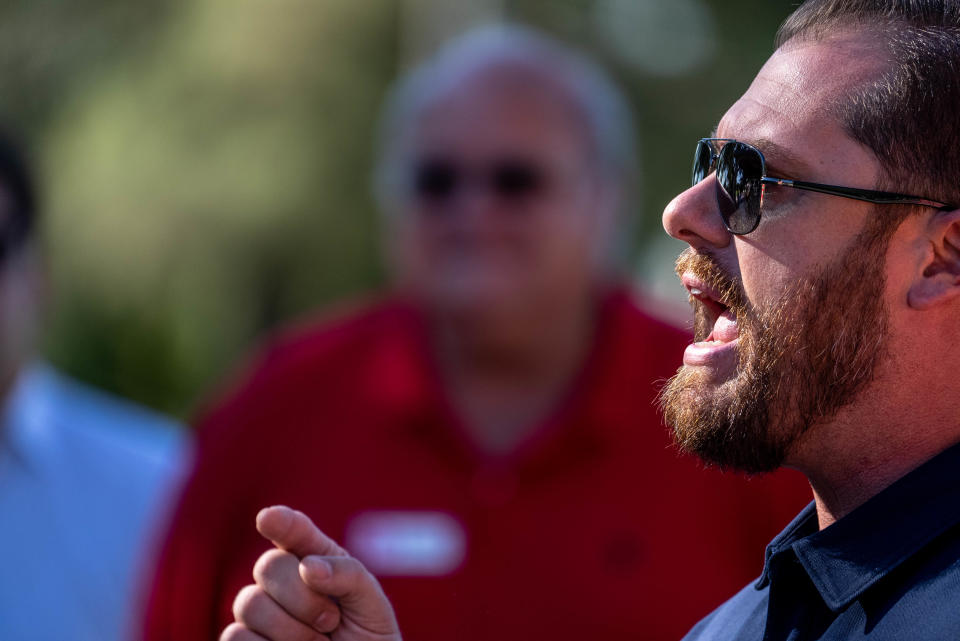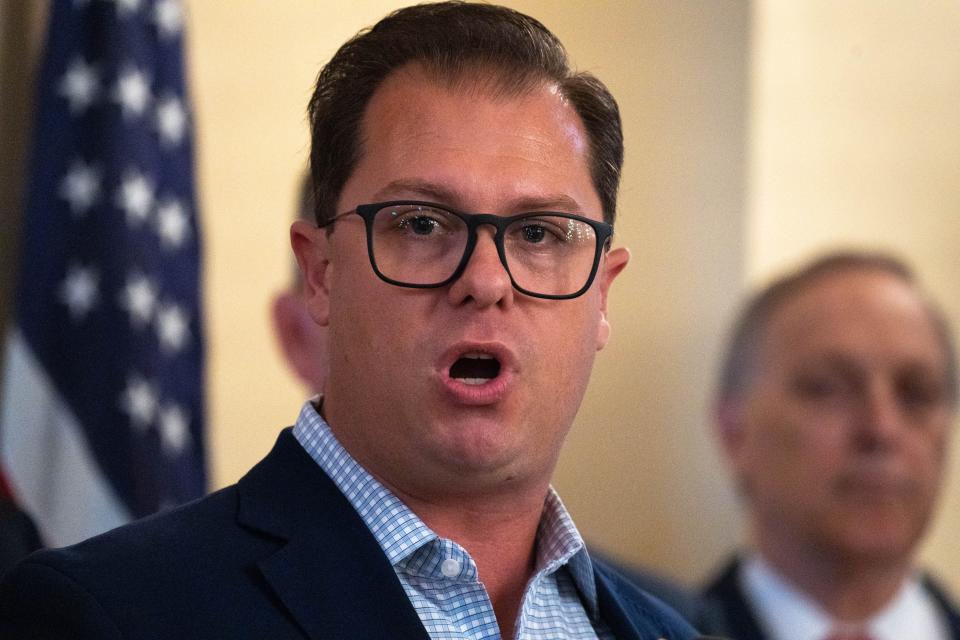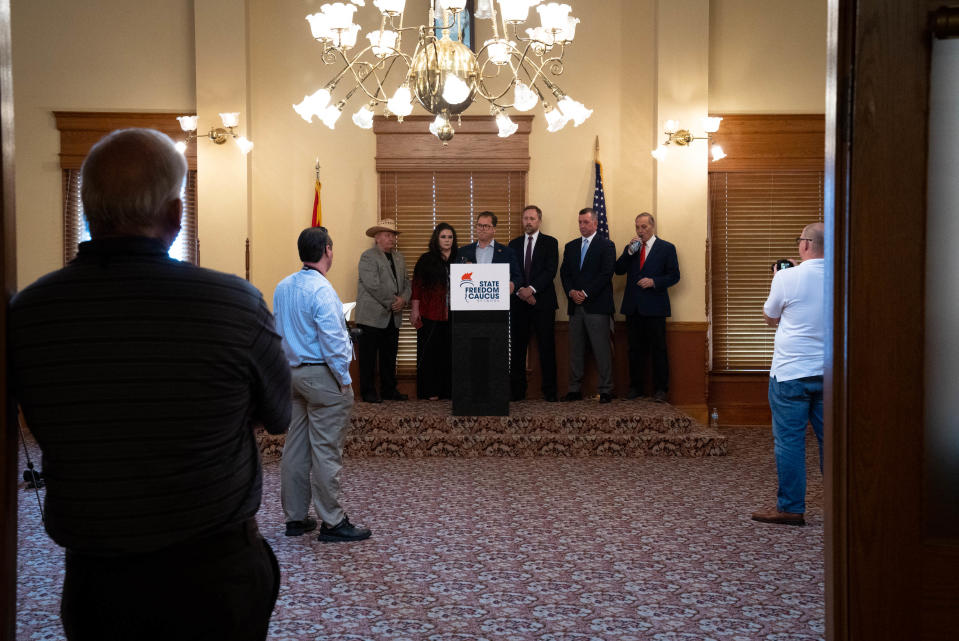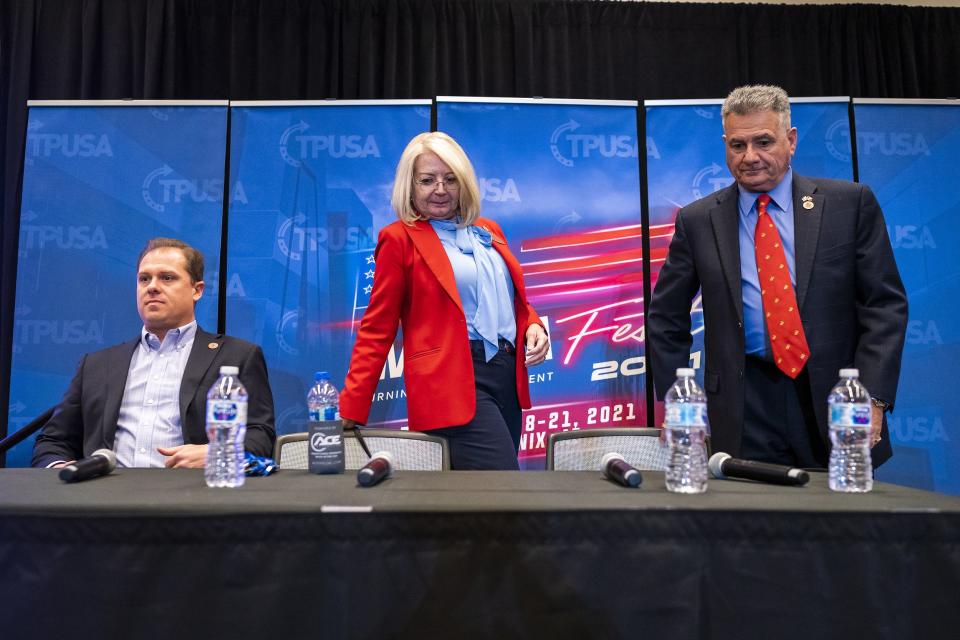Jake Hoffman, fake elector and Freedom Caucus leader, personifies conservative power
To state Sen. Jake Hoffman, chair of the far-right Arizona Freedom Caucus, Democrats are "anti-American" members of the "party of death and destruction."
He said recently on social media that Gov. Katie Hobbs, whom voters elected in November, is promoting an "insane leftist agenda." On the issue of legal abortion, which he opposes, he calls her “a monster.”
The sharp-tongued politician is not much kinder to Republicans who don't fit his Trump-supporting, ultraconservative ideals.
Last year, for example, he bashed former House Speaker Rusty Bowers as a "tyrant" who didn't believe 2020 election conspiracies weren't backed by "mountains of evidence" and whose "lunacy" was dividing Republicans.
A month later, Hoffman triggered then-House Majority Leader Ben Toma, R-Glendale as tear gas fumes filled the state Capitol's plaza outside in the aftermath of protests over the U.S. Supreme Court's overturning of Roe v. Wade, accusing Toma of failing to be sufficiently pro-life.
Toma can be seen in the House video pointing a finger threateningly and nearly lunging at Hoffman while accusing him angrily of launching a "political stunt."
Both in his political and business life, Hoffman has made a career of antagonizing Democrats and moderate Republicans, all the while promoting — and monetizing — his uncompromising political views. Well-connected and politically savvy, Hoffman has outsized influence in the Senate and a close relationship with Senate President Warren Petersen.
At 38, he’s found success both as a politician and in the field of political marketing, though he’s received intense criticism nationally for using deceptive, ethically questionable tactics in his companies. One of his firms, Rally Forge LLC, was infamously exposed as a social media “troll farm” that employed teenagers to spread disinformation before he was first elected to the Legislature.
Now nearing his fourth year as a state lawmaker, he's hitting his stride as a politician.
He can be hypocritical at times: He’s a heavy promoter of limited government but took Paycheck Protection Program funds in 2020 for the "troll farm" company. Although he's said that politicians should not use "hyperbole,” he’s one of the most frequent users of it.
Critics — who include conservative Republicans — worry that his brand of politics will have an even greater negative effect on elections next year that could flip the Legislature to Democrats for the first time in decades.
His high profile and his intense focus on 2020 election issues could also cause some personal trouble for him: He's a likely target of Democratic state Attorney General Kris Mayes' office as one of 11 Republicans who, as "alternate electors," engaged in a coordinated multistate plan to try to flip the 2020 election for then-President Donald Trump,
Mayes said last month those would-be electors are under investigation but hasn't divulged more details. Her announcement followed news of legal peril for fake electors in Michigan, where electors were charged with felonies, and Georgia, where several electors have been offered immunity deals while three others have been charged with felonies including racketeering.
Yet for Arizona constituents on the far right, he’s a superstar.

‘Tip of the spear’ for conservative principles
In this year's session, Petersen appointed Hoffman chair of both the powerful Senate Government Committee and the Senate Committee on Director Nominations. Hoffman has used the latter as an inquisition to purge perceived leftism from the ranks of state agency heads appointed by Hobbs and a bully pulpit to advance right-wing talking points.
Hoffman is a strong advocate for typical GOP issues such as gun rights, border control and opposition to abortion. He’s usually at the forefront of far-right issues like conspiracy-minded election changes or opposing LGBTQ+ rights. And he's been a force behind the scenes, from bills like the Proposition 400 transportation tax measure to internal policy requiring all bills to have the support of a "majority of the majority" before they can come up for a vote.
"Sen. Hoffman has proven that when conservatives fearlessly champion the principles of freedom, every Arizonan is better off," said state Rep. Jacqueline Parker, R-Queen Creek, his running mate and the Arizona Freedom Caucus's vice chair. His track record as a politician over the past 10 years "speaks for itself," she said.
Rep. Alexander Kolodin, R-Scottsdale, a freshman legislator and another caucus member, praised Hoffman’s leadership on issues including the tax rebate for families in this year’s budget and helping to advance Kolodin’s bill to temporarily relieve the Rio Verde community’s water supply.
“He’s the tip of the spear,” Kolodin said. "He's a master strategist."
Some of his other peers, however, see Hoffman as a problem. Rep. David Cook, R-Globe, blames Hoffman for harming the health of rural Arizonans by holding two bills dealing with healthcare policy in rural areas this session. He voted against several Hoffman bills in retaliation, drawing ire from Freedom Caucus members and a compliment on social media by House Democrats.
“The way that Sen. Hoffman has acted in the Senate, against the people that I was elected by and represent in rural Arizona, is contrary to what is the recipe for successful businesses and the communities in their lives," Cook told The Arizona Republic.
In July, former lawmaker Shawnna Bolick, R-Phoenix, slammed Hoffman and the Freedom Caucus during her interview with Maricopa County Supervisor Bill Gates to replace former Sen. Steve Kaiser, R-Phoenix, who resigned after the Freedom Caucus helped dash his plans for two bills designed to help make housing more affordable.
More on Arizona politics: 11 Republicans affirmed Donald Trump won in Arizona. What to know about the fake electors
“In 2021, I had many confrontations with Hoffman, so I’m not part of their wing. I might agree with the principles of what their group is supposed to be, but I just don’t support their tactics," Bolick, who's considered a far-right lawmaker herself, told Gates in a recorded interview first uncovered by the Arizona Capitol Times. "I feel like they are going to be the reason why we lose both the House and the Senate."
Some Democrats who work with Hoffman hold even harsher views of him.
Freshman Sen. Priya Sundareshen, D-Tucson, said Hoffman caused "hard feelings" and angst by holding a bill for weeks that would have extended the operational life of the Arizona State Schools for the Deaf and Blind in the Senate Government Committee he chairs and then amending the bill to extend the school for only two years.
He said at the time the shorter timeframe was needed so lawmakers could ensure the school was delivering the best education possible for students. A compromise later resulted in Hobbs signing a four-year extension bill.
"Obviously it was a political game," she said, adding that it was a "vague" fight that had no clear purpose, despite Hoffman's explanation. "It just seemed very inappropriate to be targeting deaf and blind children in that way and putting their educational needs at risk."
Hoffman declined to talk to The Arizona Republic or answer any questions for this article.
First stop: Higley school board
Hoffman's ascension from elected state representative to influential state senator in three years may seem sudden, but his political career has been cultivated carefully over a decade and helped by powerful friends.
Hoffman moved from California with his parents in his early teens, and after graduating from Greenway High School in Phoenix, he earned a bachelor of science degree in exercise and wellness at ASU's now-inactive School of Nutrition and Health Promotion.
He also met his wife, Kimberly, who now works as a Mesa public school teacher, while they attended ASU. They have five children.
He spent about five years after college working as the fitness and wellness director for the community of Sun City Anthem in Florence, Arizona. His “proactivity and stewardship” helped the community save $150,000 and “unseen revenue,” according to a 2012 blog post under the title "Jake Hoffman For Higley School Board" while he was running for the Higley Unified School District school board.
In a 2012 radio interview, Hoffman said he was running for the school board because he and his wife “believe that we all have been given talents and it’s our job to live with passion, and to use those talents to help others.” The board needed "regular people" like himself instead of education experts, he told the host, Gilbert physician Dr. Anne Borik.
Yet Hoffman began 2012 with hopes to win a seat in the state House of Representatives. He filed as a candidate that year, raised more than $2,000 in donations and spent a few hundred dollars on promoting his legislative campaign, state records show.
It was not yet his time to be a lawmaker: In 2012, current U.S. Rep. Andy Biggs ran as a team with former lawmaker and charter-school owner Eddie Farnsworth and then-political newcomer and current state Senate President Warren Petersen for the Senate and two House seats.
Hoffman knew them while they all served as GOP precinct committee members in what was then Legislative District 12, which covered Gilbert and Queen Creek. Biggs, Farnsworth and Petersen declined to talk to The Republic about their relationship with Hoffman.
In July 2012, Hoffman gave up his run for the Legislature and transferred that campaign's remaining $1,100 to his fledging school board run.
Unlike the three more experienced politicians, Hoffman attends a conservative, non-denominational Christian church and is not a member of the Church of Jesus Christ of Latter-day Saints.
Hoffman, however, became a close ally. Farnsworth and Biggs, along with Petersen's brother, then-Gilbert council member Victor Petersen, endorsed Hoffman, who narrowly won a seat on the school board.

Petersen sells Hoffman a Queen Creek home
Venessa Whitener, a former Higley school board president and longtime board member, also served as a GOP official in Legislative District 12 back in 2013 with Hoffman.
He didn't like her middle-of-the-road political style and put his agenda before a positive working relationship with the five-member school board, she told The Republic.
At the first meeting he attended as a board member, Whitener said Hoffman told her, "I will never speak to you unless it's on the dais" during school board meetings. She added that he kept his word except for an occasional "hello."
Whitener said Hoffman accomplished little while grandstanding with self-serving speeches at meetings and preparing for his next office. He would criticize her and other board members with whom he had a "contentious" relationship in a conservative Gilbert blog and then use the references in future political mailers, she said.
Hoffman resigned from the board in September 2015 after moving out of the Higley school district, which disqualified him from the office.
He said in a statement at the time that he was proud of what he'd done "to increase the transparency of the governing board’s public discourse, limit frivolous spending and unnecessary administrative pet projects" and create "a more responsive, customer-centric school system."
He moved to Queen Creek, where he immediately began running for the Queen Creek Town Council with help from Warren Petersen's family. The first contribution listed in his initial campaign finance report was $300 from Petersen and his wife.
Aaron Turley, the husband of Petersen's recently deceased sister, Emilena Turley, who was then a Queen Creek council member, gave $10. Helping round out the more than $13,000 that Hoffman collected from October to December 2015 was Biggs, then the state Senate president, who gave $200 with his wife, and Scot Mussi, head of the conservative Free Enterprise Club.
Local developers also gave Hoffman thousands of dollars in contributions.
But the biggest help came from VIP Homes, Petersen's family home-building company, which bought Hoffman's Gilbert home and sold him a home in Queen Creek. Petersen helped broker the deal.
VIP later sold the Gilbert home at market price for an apparent $25,000 loss and also allowed Hoffman to take possession of the new home in August 2015 rather than after the deal's closing date in September, which allowed Hoffman to meet the town's requirement for council member candidates to have lived in the town for at least one year before the Aug. 30, 2016, primary election.
The housing deal is documented in public records collected by a watchdog group that warned of a possible conflict of interest, publishing the findings in a 2016 Facebook video.
More on the fake electors: Arizona fake electors face legal jeopardy, experts say
Tyler Montague, president of Public Integrity Alliance, said he and others were concerned that Hoffman could vote on a lawsuit pending at the time that VIP Homes had filed against Queen Creek. The lawsuit was later thrown out of court and Hoffman never voted on anything related to the suit, which made the concern moot.
Petersen downplayed the incident and said Montague, a Republican political consultant, "hates conservatives." He declined to discuss details about it or talk about his relationship with Hoffman.
"Hoffman purchased a VIP Home just like thousands of other people," Petersen said. "He also participated in the trade-in program just like any other customer."
Hoffman won his election and served a four-year term on the Town Council that expired in January 2021, after he'd been elected to the state House.
Business ethics at Hoffman's companies questioned
As he built his political career, Hoffman helped African children get an education, worked in marketing and took a job for two years as the spokesperson for the Maricopa County Republican Party.
But it's the work he's done with Turning Point USA and his companies Rally Forge LLC and 1Ten LLC that have made his name nationally known. Deception is his business model, along with tactics used widely in Russia and Eastern Europe.
ProPublica and Vice News broke the story in 2018 of a "mysterious" company that had spent a few thousand dollars on a Facebook campaign urging progressives to vote for Green Party candidates in several close mid-term elections around the country. The ads didn't contain disclaimers required by law. But the Federal Election Commission dismissed a complaint in 2020 against the campaign, which had been run by a group called "America Progress Now," after an Arizona man named Evan Muhlstein wrote the FEC and apologized for failing to comply with the rules, saying he was "inexperienced."
In 2021, The Guardian reported that it had reviewed internal Facebook documents showing the company responsible for the "deceptive" ads was Rally Forge, and that Hoffman and two other Facebook Page administrators for Turning Point USA had served as page administrators for the America Progress Now Facebook page.
In 2019, NBC News reported that billionaire Andrew Beal contributed $350,000 to RallyPAC, a super PAC owned by Hoffman, and that most of the money was then paid to Rally Forge LLC for a "conspiracy-theory-driven Facebook meme campaign" to help Trump's reelection campaign. The report also noted that campaign finance records showed that Rally Forge had also done work for Turning Point USA.
As The Republic reported last year, Hoffman also had worked under contract for Turning Point USA as the Trump-supporting group's communications and media director.
He and Tyler Bowyer, the chief operating officer for the nonprofit and its related advocacy group, Turning Point Action, worked closely with former state lawmaker and unsuccessful U.S. Senate candidate Kelli Ward to get Ward elected in 2019 by GOP officials as state party chair.
Operations included a "Navajos for Trump" campaign in northern Arizona with a prominent billboard near the town of Sanders stating it was paid for by Turning Point Action, plus a half-page newspaper ad in the Navajo Times and Facebook site, none of which had any visible backers or supporters.
The Facebook site continues to post numerous pro-Trump messages this year, but its administrators did not respond to a request for comment.
Then, in September 2020, during Hoffman's legislative campaign, came the "troll farm" news: Teens paid by Rally Forge "at the direction of Turning Point Action" were pumping out disinformation on social media for the operation, aiming at 2020 voters with election- and COVID-related conspiracy talking points, the report in the Washington Post detailed. The revelation soon spurred Facebook and Twitter to ban all related accounts, including that of Rally Forge and Hoffman's accounts.
A former employee who was at the firm at the time said that as a conservative, many items he posted or created "were something I totally aligned with."
"But there is a large portion of the content where I'm like, 'Look, I'm an RNC propagandist!'" said the man, who feared retribution if he were named. "Like, I'm blatantly misleading the public here."

Most of the content, which also promoted hunting rights, consisted of "fairly standard political and issue-based advocacy work," states a 2020 report on the operation by the Stanford Internet Observatory.
"However, we observe extensive inauthenticity in the form of fake accounts, and in the attempts to manipulate the public," the report states. "It appears that Rally Forge was executing electoral and issue-based astroturfing campaigns, in which a combination of real and inauthentic accounts posted comments and replies to relevant conversational threads on multiple platforms, with the intent of creating the perception of a groundswell of public opinion on one side of a particular topic."
Hoffman defended his company's work as legit, telling the Post in 2020 that "every working team within my agency works out of dozens of collaborative documents every day, as is common with all dynamic marketing agencies or campaign phone banks for example.”
Astroturfing and building online consensus isn't illegal in itself, though it could be if false facts are used to raise money, according to Kory Langhofer, a Phoenix attorney who's represented Trump and the Arizona Senate election ballot review.
"Having fake accounts is almost certainly a violation of the terms of service of Twitter, Facebook or whatever, but it's not like a crime," he said.
Turning Point Action paid Rally Forge $1.8 million for "social/digital" and media ad placement from July 2020 to June 2021 alone, a copy of its 2020 IRS Form 990 on OpenSecrets.org shows.
Yet during the pandemic, Rally Forge applied for a PPP loan in 2020, purportedly to save the job of one employee, online records show, and received $17,738. Oddly, the company was listed as being in the "Motor Vehicle Supplies and New Parts Merchant Wholesalers industry." The government forgave the debt and $198 in accrued interest, according to ProPublica's PPP Tracker site.
Rally Forge has been at the top of Hoffman's list of sources of personal compensation in mandatory financial disclosure forms he's filed with the Arizona Secretary of State's Office from 2020 through 2022.
The company's minimally detailed webpage, rallyforge.com, was taken down by early 2021, having never listed the names of Hoffman or anyone else affiliated with the firm, preserved examples on archive.org show.
"We only work with those that fight for truth," one of the archived pages states.

Newer Hoffman firm draws scrutiny
Hoffman's disclosure forms for the past two years show two newer companies that earn him money, including one called Forged Communications — which is a term often used to describe fake emails that can be used in spoofing or phishing schemes.
The second firm, 1Ten LLC, made news last year for its use of a dark money source. Campaign finance records show the firm received $2.1 million in 2022 that was used for political advertising promoting Kari Lake for governor and advocating the defeat of her Republican primary-race opponent Karrin Taylor Robson.
The money came from a political action committee called Putting Arizona First, which listed a Phoenix UPS store for its address, The Republic reported last year. The PAC's sole donor was a company called SPH Medical LLC. Owners of a California medical supply with the same name denied they'd been involved.
Montague and the Public Integrity Alliance filed a complaint with the Maricopa County Elections Department alleging Putting Arizona First had "willfully misrepresented" its funding source or used an "unregistered shell entity" to hide the actual source.
As correspondence obtained by The Republic under state records law shows, the Maricopa County Elections Department dismissed the complaint in December 2022 after receiving a four-page letter from the PAC's New Orleans-based law firm, Davillier Law Group LLC, explaining that SPH Medical LLC was a real corporation that had been registered in Delaware since 2017.
The complaint's accusations were therefore false, said the the letter, signed by Hoffman ally Kolodin, a lawyer who heads the law firm's Phoenix office.
Kolodin included no other information about SPH Medical or who was behind the funds in the explanatory letter to the county and declined to reveal the source to The Republic.
"It doesn't mean something shady didn't happen," Montague said. "It's got the Hoffman-Bowyer fingerprints on it, but nobody can prove anything."
It's impossible to tell how much money Hoffman has made personally from his political firms. Besides what he earns from them, he and his father also manage a family trust.
But Hoffman and his wife, who took out a loan of $186,000 in 2010 for a Gilbert home, have upgraded their dwellings significantly over the past decade. In 2020, records show, they moved from the Queen Creek home Petersen sold for $326,038 and into a larger house in the town that had a sales price of $1,140,000.
Conspiracy promoter and fake elector
Hoffman won in his Republican-heavy district in November 2020 despite the "troll farm" accusations and dove into the conspiracy-laden waters with gusto.
That December, before he took office, Hoffman joined 30 other current and former Arizona elected officials in a letter to then-Vice President Mike Pence demanding an audit of the election or to make Trump president. He sent his two-page letter to Pence on Jan. 5, 2021, asking the vice president to ignore the will of Arizona voters and let the state Legislature choose electors. And he joined 10 other Republicans, including Bowyer and state GOP Party Chair Ward, in creating a slate of alternate electors for Trump.
Hoffman has repeatedly declined to say how the group of fake electors knew to convene at state party headquarters in December 2020, walking away from reporters on at least two occasions, in 2022 and again this year, when asked about the event.
A spokesman for state Attorney General Kris Mayes' office said last month an "investigation is ongoing" into the fake elector scheme, which was repeated in several other states.
Voters of the new Republican-leaning Legislative District 15 that covers Queen Creek and San Tan Valley promoted Hoffman to the state Senate last year. As a lawmaker, Hoffman has tried to pass dozens of bills that would change the election system in Arizona, including proposals that would ban voting centers, ballot drop boxes and electronic ballot-counting.
As the New Yorker magazine reported in 2021, the head of the Koch-funded Heritage Action group praised Hoffman in a leaked video for helping move an election bill authored by the group. Hoffman and other lawmakers who want to please their conspiracy-minded constituents have been mostly unsuccessful at forcing major changes, especially after the election of Hobbs.
In July 2022, Hoffman and Biggs, the former chair of the U.S. House Freedom Caucus, announced the formation of the caucus's Arizona chapter. Hoffman said at the time the group would oppose both Democrats and Republicans who didn't agree with their positions, which it has done.
Yet the Arizona Freedom Caucus and its members, whose ranks grew after the 2022 election, have not always been able to sway policy decisions. A threat on the first day of this year's legislative session to sue Hobbs over her executive-order powers proved hollow, for instance. But the group remains a potent force under Hoffman's leadership.
Reach the reporter at rstern@arizonarepublic.com or 480-276-3237. Follow him on X: @raystern.
This article originally appeared on Arizona Republic: Jake Hoffman: What to know about fake elector, Freedom Caucus leader

